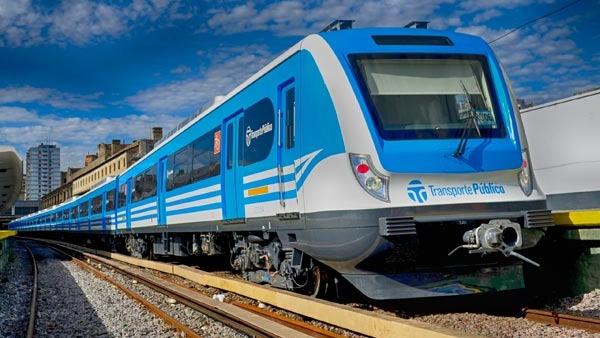 Intercity bullet trains made by China's CSR Qingdao Sifang Co Ltd are put into operation in Buenos Aires, Argentina, on July 22, 2014. (JIANG CHAO / XINHUA)
Intercity bullet trains made by China's CSR Qingdao Sifang Co Ltd are put into operation in Buenos Aires, Argentina, on July 22, 2014. (JIANG CHAO / XINHUA)
During the COVID-19 pandemic, Wang Wenjun carries two full sets of protective clothing, weighing about 5 kilograms, to board a China-Europe freight train and drive it from China to Russia.
The 9.8-kilometer journey starts from Manzhouli, Inner Mongolia autonomous region, and ends in Zabaykalsk, Russia.
The China-Europe freight train service, starting from cities across the country, leaves China at border railway ports, including Manzhouli.
Wang is the train's last driver in China. Afterward, the train is handed over to Russian train drivers and then maybe European ones.
ALSO READ: China remains EU's main trading partner
 Wang Wenjun drives a China-Europe freight train. (PHOTO PROVIDED TO CHINA DAILY)
Wang Wenjun drives a China-Europe freight train. (PHOTO PROVIDED TO CHINA DAILY)
He is one of 21 China-Europe freight train drivers in Manzhouli.
Wang said he is busier during the pandemic. In the past, he could usually take a 24-hour-break between shifts. Now the time has been reduced to about 15 to 16 hours.
He makes two journeys in three days now.
The pandemic has restricted people-to-people exchanges but cannot stop the freight trains.
Last year, a record 12,400 freight train services operated between China and Europe, a year-on-year increase of 50 percent. They carried 1.14 million containers, up 56 percent and another record, according to China Railway Corp, the national railway operator.
READ MORE: Train carries anti-virus supplies to Poland
The service has been hailed as a vital channel amid the COVID-19 pandemic, transporting much-needed commodities and daily supplies including protective masks and medical supplies between China and Europe.
As an important symbol of the Belt and Road Initiative, the China-Europe freight train service has become a major bridge and green channel connecting Asia and Europe with its unique advantages of high efficiency and extensive route network.
Zhao Lijian, spokesman for China's Foreign Ministry
Foreign Ministry spokesman Zhao Lijian compared the service with the ancient Silk Road.
"As an important symbol of the Belt and Road Initiative, the China-Europe freight train service has become a major bridge and green channel connecting Asia and Europe with its unique advantages of high efficiency and extensive route network," he said at a news conference this week.
He also said the operation of the service during the pandemic conveys the concept of the shared future for mankind. It also shows "Chinese power" in the global battle against COVID-19 and boosts the economy.
Border railway ports have witnessed the growth of the freight train service in Ereenhot and Manzhouli in Inner Mongolia, Alataw Pass in the Xinjiang Uygur autonomous region and Suifenhe in Heilongjiang province, according to local railway operators.
At the Alataw Pass train station, a 24-hour customs clearance system has been implemented to assist in the operation of the service.
Ereenhot railway station has upgraded facilities and improved efficiency to ensure the smooth operation of the service.
From Jan 1 to Wednesday, 299 trains had passed through Manzhouli railway port and Suifenhe railway port, a year-on-year increase of 52 percent.
Besides feeling busier, train driver Wang's work is very different from the pre-pandemic era.
He spends 30 minutes to put on protective clothing in accordance with protocols, including gloves and shoe covers. One set comprises 30 pieces.
Besides that, he works for a month and spends another two weeks in quarantine and then takes a two-week break. It means that Wang can only see his family every six weeks.
As a train driver, he is quite proud of being selected to drive the renowned China-Europe freight train.
"I don't know the fancy word ...people call it the green channel during the pandemic and so on," he said."I know when I was selected as the train driver, my wife and my daughter were all quite happy and proud of my accomplishment."
Contact the writer at luowangshu@chinadaily.com.cn


